
- Homepage
- Industry
- Item
- Movie
- Barbershop (14)
- Barbie (5)
- Candyman (5)
- Ghostbusters (6)
- Goodfellas (6)
- Halloween (5)
- Harry Potter (5)
- Interstellar (8)
- Jurassic Park (13)
- Movie (11)
- Pulp Fiction (7)
- Rounders (7)
- Scarface (5)
- Scream (4)
- Star Wars (6)
- The Dark Knight (5)
- The Godfather (9)
- The Matrix (4)
- Toy Story (5)
- Uncut Gems (4)
- ... (4873)
- Object Type
- Signed By
- A Star (5)
- Adam Sandler (13)
- Al Pacino (7)
- Charlie Sheen (5)
- Christian Bale (18)
- Dan Aykroyd (8)
- Daniel Radcliffe (10)
- Greta Gerwig (6)
- Hans Zimmer (6)
- Jeff Goldblum (5)
- John Travolta (5)
- Kevin Smith (9)
- Martin Scorsese (11)
- Matt Damon (16)
- Quentin Tarantino (10)
- Robert Zemeckis (6)
- Tim Allen (7)
- Tony Todd (5)
- Wes Anderson (5)
- Whoopi Goldberg (5)
- ... (4845)
- Subject
1984 Screenplay AGNIESZKA HOLLAND German Film BITTERE ERNTE / BITTER HARVEST
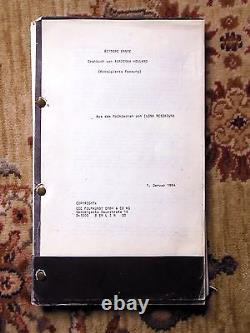
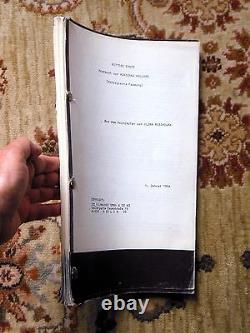
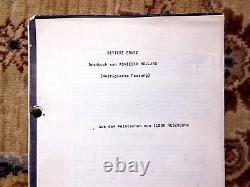
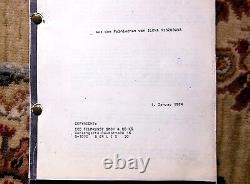
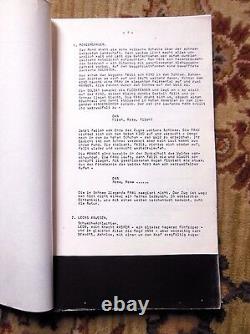

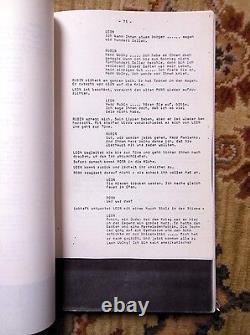
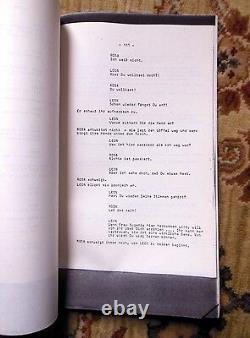

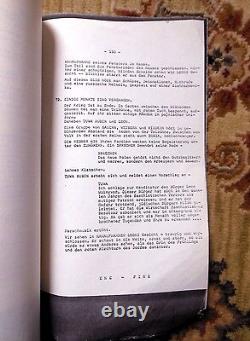
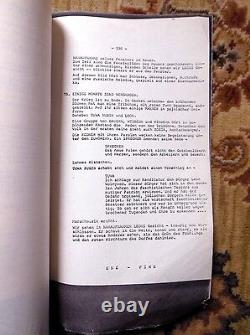
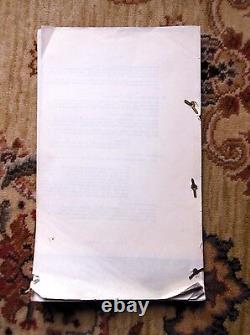


1984 Original Draft German Screenplay by AGNIESZKA HOLLAND for the Academy Award Nominated Best Foreign Film BITTERE ERNTE / BITTER HARVEST. BITTERE ERNTE - DREHBUCH von AGNIESKA (aka AGNIESZKA HOLLAND) - Korrigierte Fassung - Aus dem Polnischen von ILONA RESZKOWNA. BITTER HARVEST - Screenplay by AGNIESZKA HOLLAND - Corrected version -- from the Polish by ILONA RESZKOWNA. Note: The Polish Book was by Ilona Reszkowna AND Paul Hengge; Agnieszka Holland; and Hermann H Field. Original Early Draft SCREENPLAY / SCRIPT of this AWARD WINNING GERMAN FILM (many European Film Awards, nominated for Academy Award in the Best Foreign Film category). Screenplay by and Directed by the noted Renowned Female POLISH DIRECTOR - AGNIESZKA HOLLAND. Photocopied sheets on 8.5" x 14" legal-size paper (photocopying was, and still is, how original copies of a script were distributed to agents, producers, directors, and others involved in a film), 3 hole-punched in their left margin, pages printed on one side only, 112 pages plus a title page, bound with 3 brass brads.
This draft script has a few sections lined out and a few handwritten words, in German. These lines and notes are photocopied on this photocopied draft. GOOD condition: the first page is torn around the 3 punched holes and has pulled from its brass brads.
The first and last few pages have creasing, edge wear and some edge chips; all the pages have a black bottom margin, being 8.5" x 11" pages printed on 8.5" x 14" sheets; there are the usual copy machine type of dust marks, etc. Overall the script is complete, bright and clear. RARE DRAFT of this IMPORTANT WEST GERMAN / POLISH FILM by AGNIESZKA HOLLAND. About the Film BITTER HARVEST (from Wikipedia).
This West German film was first released in 1985 under the title Bittere Ernte. Armin-Mueller Stahl plays a Polish farmer living under the wartime Nazi occupation. Stahl isn't too offended at the prospect of answering to the Germans; in fact, he has profited by confiscating the property of his neighbor, a wealthy Jew. His conscience doesn't disturb him until a starving Jewish woman (Elisabeth Trissenaar) stumbles onto his property.
At first Stahl shelters her, but his baser instincts surface; she is in no position to refuse when he ultimately rapes her. She even comes to fall in love with Stahl--and kills herself when another woman moves in with him. Stahl survives the war with health and wealth intact, only mildly disturbed by the misery he has caused. This Oscar-nominated film was to have been lensed in director Agnieszka Holland's native Poland; upon the imposition of martial law, production was switched to Sweden.
About the Renowned Polish Film Director AGNIESZKA HOLLAND (from Wikipedia). Agnieszka Holland (born November 28, 1948) is a Polish film and TV director and screenwriter. Best known for her political contributions to Polish cinema, Holland is one of Poland's most prominent filmmakers.
Holland was born in Warsaw, Poland in 1948. She is the daughter of two journalists: Irena (née Rybczynska) and Henryk Holland. Holland's mother is Catholic and her father Jewish, but she did not receive a religious upbringing.His parents were killed in the Warsaw Ghetto; Holland's mother participated in the 1944 Warsaw Uprising and belonged to the Polish resistance movement. Her first major film was Aktorzy Prowincjonalni (Provincial Actors), a 1978 chronicle of tense backstage relations within a small-town theater company which was an allegory of Poland's contemporary political situation. It won the International Critics Prize at the 1980 Cannes Film Festival. Holland directed two more major films in Poland, Goraczka (1980) and Kobieta samotna (A Lonely Woman) in 1981, before emigrating to France shortly before the December 1981 imposition of martial law in Poland. She was told that she could not return to Poland, and was unable to see (or contact) her daughter for over eight months.
Fever was entered in the 31st Berlin International Film Festival. Knowing she could not return to Poland, Holland wrote scripts for fellow Polish filmmakers in exile: Wajda's Danton, A Love in Germany (1983), The Possessed (1988) and Korczak (1990). She also developed her own projects with Western European production companies, directing ANGRY HARVEST (1985), To Kill a Priest (1988) and Olivier, Olivier (1992).
HOLLAND RECEIVED AN ACADEMY AWARD NOMINATION FOR BEST FOREIGN LANGUAGE FILM FOR ANGRY HARVEST, A GERMAN PRODUCTION ABOUT A JEWISH WOMAN ON THE RUN DURING WORLD WAR II. Holland's best-known film may be Europa Europa (1991). Agnieszka Holland took over the chairmanship of the European Film Academy board in January 2014. This script item comes from the estate of Paul Kohner, who as an agent for hundreds of actors, writers, directors, etc.Kohner was constantly sent scripts to "pitch" to his clients, the studios, or investors. Kohner had a remarkable life!
Kohner was born in Czechoslovakia in 1902, and he was a journalist working at his father's newspaper. He came to Hollywood after interviewing Carl Laemmle, who gave him a job as a publicity man.
In the early 1930s, and left Universal in 1938, becoming a publicity agent. Among his clients were some of the greatest film stars ever, including Greta Garbo, Ingrid Bergman, and also great directors such as John Huston and Billy Wilder. He had close personal friendships with many of his clients, and he saved every bit of correspondence and paper work from his agency! He was married to actress Lupita Tovar from 1932 until his death in 1988. Amazingly, after his death, few institutions showed interest in his immense files, and only a small amount ended up being saved, with a lot literally thrown away! Kohner's estate in 1989. About PAUL KOHNER (from his March 19, 1988 New York Times obituary). Paul Kohner, a prominent Hollywood agent, died of heart failure Wednesday at the University of California, Los Angeles Medical Center. He was 85 years old. During the 50 years that Mr. Kohner headed the Paul Kohner Agency, he represented hundreds of motion-picture actors and directors, including Ingmar Bergman, Maurice Chevalier, Marlene Dietrich, Greta Garbo, John Huston, Liv Ullmann and Billy Wilder. Kohner was born in Teplice-Sanov in what is now Czechoslovakia, and wrote for his father's film-industry newspaper in Prague. In 1920, he interviewed Carl Laemmle, the president of Universal Pictures, who invited Mr.Kohner to come to the United States to work for Universal. Kohner served in the company's publicity, distribution and production departments in New York and Los Angeles, and became head of Universal's European division in Berlin in the late 1920's. Kohner opened his talent agency in 1938, and many of his early clients were European actors who had fled from the Nazis.
Kohner's agency expanded during the 1940's and 1950's, and his illustrious client list grew to include Yul Brynner, Henry Fonda, Walter Huston, David Niven, Marcel Pagnol, Douglas Sirk, Lana Turner and Erich von Stroheim. He also arranged American distribution for the films of Ingmar Bergman, who once said that Mr.
Kohner's life includes the history of the movies. And John Huston, a client for more than 40 years, said of Mr. Kohner: We lasted through marriages and wars and good times and disasters - nothing lasts forever except Paul and me.

